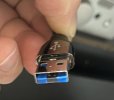Hola,
Tengo un problema de silbido proveniente de los parlantes con mi configuración actual que uso para producción musical (grabación de guitarra y voz), escucha música y llamadas. Creo que se debe a una fuga de alimentación del USB pero me gustaría que los expertos me lo confirmen.

El archivo adjunto es una grabación del silbido con un teléfono inteligente a ~5 cm del altavoz a un volumen de escucha normal.
Contexto :
Mi configuración es: Computadora (descripción
aquí ) -> Focusrite 2i4 2nd GEN (usando los últimos controladores ASIO) -> Yamaha HS5 y Sennheiser H560s.
No escucho el silbido con los HD560 conectados a la salida de auriculares. Sólo con los monitores.
Todos mis equipos eléctricos (tanto monitores como computadora, pantalla) están conectados al mismo interruptor de alimentación. Ninguna de las tomas de corriente de la habitación tiene conexión a tierra.
Pruebas :
- Cambiar cable USB -> Mismo problema
- Desconecté todos los dispositivos USB excepto Focusrite -> sin cambios
- desconectar la tarjeta de sonido -> no más silbido
- Cambiar la frecuencia de muestreo y el tamaño del búfer en la configuración de focusrite cuando se inició ableton -> sin cambios
- Aumentar la frecuencia de muestreo o disminuir el tamaño del búfer cuando Ableton Live está activado -> el sonido se vuelve más agudo
- Pruebe con mi vieja computadora portátil con batería -> no más problemas
- Uso elevado de la tarjeta gráfica (punto de referencia de brujas probado) -> causa peculiaridades
Preguntas :
¿Crees que mi suposición es correcta?
Si es así, parece que una solución podría ser un aislador USB. Sin embargo, el "Topping HS1" cuesta actualmente 70 €, el "Hifime High-Speed USB Isolator v2" y compré la tarjeta de sonido por 100 €, así que me pregunto si realmente tiene sentido... Existen alternativas más baratas (10 €) como esta
. pero parece que también introducen sus propios problemas.
Javier usó esta solución para un DAC, sin embargo, me pregunto si afectará la grabación/latencia con la interfaz.
Como
escribió Amir sobre el Mod i, "los DAC mejor diseñados no tienen ese problema". Entonces, ¿tal vez debería vender Focusrite y probar con otra interfaz?
Muchas gracias por su ayuda

